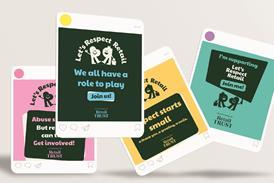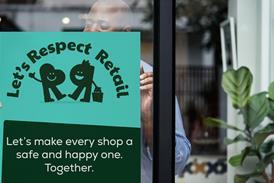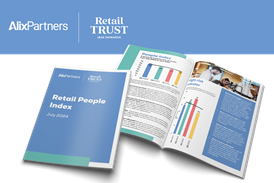
Abuse should never be part of your job, here’s how colleagues can stay safe.
While the retail sector gears up for the busiest shopping period of the calendar, our survey of over 1,000 Retail Trust colleagues revealed that 80% of you have experienced verbal or physical abuse from customers. For more than a third, this is happening on a weekly basis. And that’s not ok.
Nobody should be made to feel unsafe at work but with more than half of retail workers saying abuse has got worse over the last two years and nearly a third worry about their safety at least once every week, we’ve joined forces with retailers and colleagues to keep everyone safe.
As always, the Retail Trust’s helpline is available 24-hours a day for advice and support, so you are not alone. And since the Retail Trust and YouGov 2022 survey revealed 90% of customers admitted to losing their temper or raising their voice to somebody working in store, customer services or delivery drivers, we’re on a mission to encourage everyone to equip themselves and their colleagues with the tools they need.
Here, the Retail Trust’s director of wellbeing services, Cliff Lee, offers his advice on what you can do to stay safe in store when faced with a challenging customer.
1. Tune into your surroundings
As we have seen from the survey results, there’s an inevitability to customer abuse occurring, but the focus should be to prepare, don’t scare. Get to know your environment, where the panic button is and how to use personal protection methods such as standing behind a counter to create a physical barrier between you and an aggressive customer. Make sure you know where the safe spaces are, whether that’s outside the store or in a private staff area out the back, and use them when you need to.
2. Prevention is better than cure
Whilst threatening language or behaviour is never acceptable, it’s worth considering what could be contributing to customers’ frustrations. Our 2022 survey revealed that 90% of customers who admitted to getting annoyed or frustrated with a retail worker cited slow service or having to queue, whilst 92% blamed not enough staff or checkouts. Whilst some of these issues will be unavoidable it’s worth looking at queue management and customer service policies with managers and colleagues to ensure they are as customer-friendly as possible.
3. Stay calm
Probably one of the most difficult things to do when you find yourself in fight or flight mode, but trying to remain calm in the face of a high stress situation could help to diffuse it. Don’t retaliate to bad behaviour or shout back, instead try to maintain a calm voice and body language. We often talk about mirroring so don’t raise your voice to match the customers as that can exacerbate things. Instead, calmly ask the customer not to use abusive language, acknowledge they are frustrated and remind them you are only trying to help.
4. Support colleagues
We are all in this together so keep an eye on colleagues and be mindful of signs that they may need your support. These include raised voices, animated body language or the use of bad language. If you see or hear something, don’t feel that you can’t go over to offer your support. Strength in numbers can be really helpful in de-escalating a situation and letting your colleagues know you’re there to support them.
5. Minimise danger
Above all else, never put yourself in danger and where possible, keep some physical space between you and the customer to minimise the chance of physical attack. If you feel you’re in danger or things are escalating beyond your control, alert a colleague, store security or manager for assistance.
6. Allow yourself to recover
There’s a reason why we have cortisol and adrenaline pumping through our bodies when we’re faced with high stress situations – to protect us and keep us safe if we need to flee. This is why you might feel shaken, upset or angry after an incident with a difficult customer. After the event, it is important if possible to take time away from the shop floor to allow those feelings to subside and return to normal levels before going back to work.
7. Speak up
We all handle high stress situations differently so some people will be more affected than others. If you’ve been a victim of violence previously, for example, or perhaps you’ve been bullied as a child, then the incident may trigger recollections. So, it is important to process the incident and speak to a colleague, manager or somebody at the Retail Trust if you need to. You do not come to work to be abused and there is no shame in asking for support after any incident.
You’re not alone. You can always reach out to the Retail Trust on 0808 801 0808. We are here for you.










Was this article helpful?